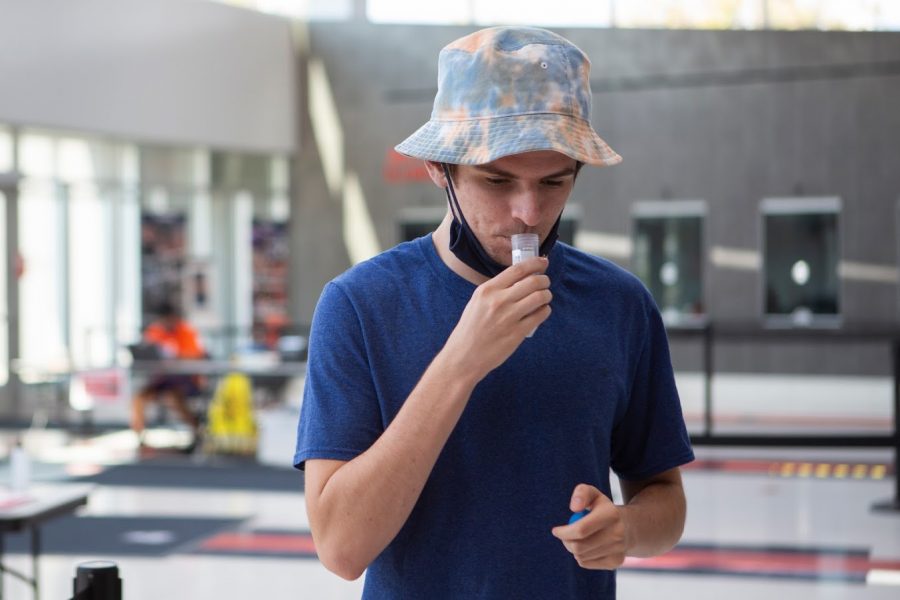University continues push to authorize COVID-19 test for emergency use
An Illinois student takes a COVID-19 test at State Farm Center on Oct. 9.
Jan 8, 2021
Last updated on Jan. 24, 2021 at 01:23 p.m.
The University of Illinois in Urbana-Champaign is currently undergoing the process to earn emergency use authorization status from the Food and Drug Administration for the rapid-based saliva test and expand the test developed by the University across the state.
The test was submitted for EUA FDA approval on Dec. 30. The saliva test is still being distributed to students under a clinical laboratory improvement amendments certification which ensures that the lab meets the federal regulation requirements for testing.
According to UI spokesperson Robin Kaler, other universities such as Purdue and Ohio State are working to adopt the rapid saliva-based testing operations similar to the University’s by obtaining their own approved certification.
Rebecca Lee Smith, a professor of epidemiology that is helping validate the test, specializes in infectious disease control. Although her area of specialization is currently timely, she laughed as she explained how she wishes it wasn’t.
Get The Daily Illini in your inbox!
“None of us who are experts in this are surprised that it happened, but we all had hoped not to see it in our lives,” Smith said in regards to the pandemic.
Smith is currently working with a team in charge of the trials to validate the University’s COVID-19 test for the purposes of FDA emergency use authorization. This team wants to make the test readily available across the state for both people with and without symptoms.
In order to get this approval for asymptomatic screening, she explained how the University’s data has to include 20 asymptomatic positive tests and 100 asymptomatic negative tests (which Smith is “pretty sure” they have) through both the nasal swab and the University developed saliva-based COVID-19 test.
Smith said that the team is currently working to get approval to test on another college campus in order to find the 20 asymptomatic people who test positive since there have been very few COVID-19 infections at the University.
They are hoping that on the other campus with a higher positivity rate, they will be able to get more COVID-19 tests to meet the criteria with the right subject pool and earn authorization.
Until the emergency use authorization use status is achieved and the test can be made more available to the public, the University will continue relying on COVID-19 test and contact tracing to limit the spread of the virus on campus.
The constant testing will likely remain for a while even after the new COVID-19 vaccine will be available, according to Smith. She said she can’t say with certainty that the vaccine will be mandated because the people involved in that decision will want to look at the safety data and efficacy of the vaccine first.
“The vaccine is not going to be a silver bullet that all of a sudden solves the pandemic, unfortunately,” Smith said.
Emphasizing the need for continuous monitoring of the virus on campus in order to make sure things are “under control,” Smith said the time it will take to return to a pre-COVID-19 lifestyle is based on the vaccine’s ability to properly prevent infection.
If the vaccine is effective at preventing infection like it is at preventing sickness, Smith estimates it will take around a year from availability of the vaccine to return to normalcy. She noted the importance of having “wide uptake” of the vaccine and “lots of messaging” supporting the vaccine in order to actually slow the spread.






